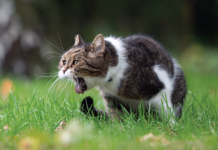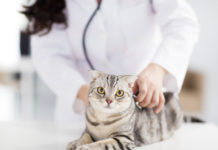Question: I understand that there is now a vaccine for FIV. I do my best to keep my cats indoors, but sometimes one of them will sneak out. Thats why my veterinarian suggests testing them every year and – thank goodness – they all test negative. What do you know about the vaccine? Should I have my cats vaccinated?
Answer: Fel-O-Vax FIV (Fort Dodge Animal Health), an inactivated or killed feline immunodeficiency virus (FIV) vaccine, should be on the market by the time you read this. The vaccine was officially released in July of this year, but because of demand, I dont know how soon it will be available to your veterinarian.
Whats the bug?
As the name implies, FIV causes an immune deficiency syndrome in cats. The virus adversely affects the immune system similar to the way human immunodefiency virus (HIV) affects people. (I should emphasize that FIV is highly specific to cats and is believed to pose no health risk to humans.) As time goes on – many years in some cases – an infected cat becomes less and less able to fight bacteria and other infectious agents in or on its body or to which it comes into contact, so the primary signs are a result of secondary infections. However, as with HIV-infected people, FIV-infected cats may live many healthy years before getting sick.
A bite from an infected cat is the major way the virus is transmitted, so it stands to reason that cats that get outdoors are at greatest risk. The only way to completely protect against FIV infection is to keep your cats away from infected cats that might bite them. Your veterinarian is wise to recommend annual testing of your access-to-the-outdoors kitties, because should any of them become infected, a specially designed health care program will assure the longest, healthiest life possible for the victim and its housemates. I cannot overemphasize the importance of routine FIV testing. For further information, I suggest you review the American Association of Feline Practitioners 2001 Report on Feline Retrovirus Testing and Management (go to www.aafponline.org) or write to the Cornell Feline Health Center (Cornell University College of Veterinary Medicine, Ithaca, New York 14853) and request a copy.
Ointment …
Since FIV was discovered in the mid-1980s, veterinarians have wanted a vaccine for cats that might be bitten by infected cats. Fel-O-Vax FIV is the first to appear on the market, but others are sure to follow. Initial studies suggest that protection is induced in 50 to 80 percent of vaccinated cats. So, even though it wont benefit every cat, the early studies are promising. The killed viruses in the vaccine cannot cause FIV infection, but vaccinated cats will test falsely positive on currently available diagnosts tests. In other words, it will be virtually impossible to distinguish a FIV-infected cat from a cat vaccinated with Fel-O-Vax FIV. All of the licensed diagnostic tests currently available to your veterinarian are designed to detect the antibodies a cat produces in response to infection. Unfortunately, the killed viruses in the vaccine stimulate production of antibodies that are indistinguishable from those found in infected cats. Other types of diagnostic tests may be available in the future, but there are a number of issues that need to be resolved before such tests have the availability, convenience, proven reliability, and cost effectiveness of those we now have.
…But with a fly in it
Not being able to distinguish vaccinated cats from infected ones has many implications:
1. It will be impossible to deliver the specialized health care necessary for infected cats because it will be impossible to identify them.
2. Testing and isolating infected cats to prevent infecting others will not be possible. To prevent the spread of infection, many veterinarians discourage adoption of FIV-infected cats into households with uninfected cats – and uninfected cats into households with infected ones. How can we tell whether a positive-testing cat is infected or merely vaccinated? Do we adopt the cat or not? One might consider vaccinating all the resident cats in the chance the potential newcomer is infected, but theres no assurance they will all receive protection.
3. Clinical assessment of sick cats with positive test results will be difficult. Do they have an FIV-associated disease or are they merely vaccinated?
4. Many shelters and other facilities designed to house stray cats routinely test for FIV before placing them into a new home; cats that test positively are often euthanized. Healthy, uninfected, but previously vaccinated cats may needlessly undergo euthanasia.
One could argue that if we know a cat has been vaccinated we shouldnt worry about a positive test result. A cats caretaker will know whether the vaccine has been given. But its not that simple; even vaccinated cats can be infected. Using current test methods, we simply wont be able to tell.
Whether to vaccinate or not is a tough decision. All of us want to provide as much protection as possible to cats that cannot be prevented from getting outdoors. This vaccine promises to help us do that. But it does extract its toll, and youll need to carefully discuss it with your veterinarian. If you do decide to use the vaccine, at the very least test your cats before administration – and give the vaccine only if they test negative.



